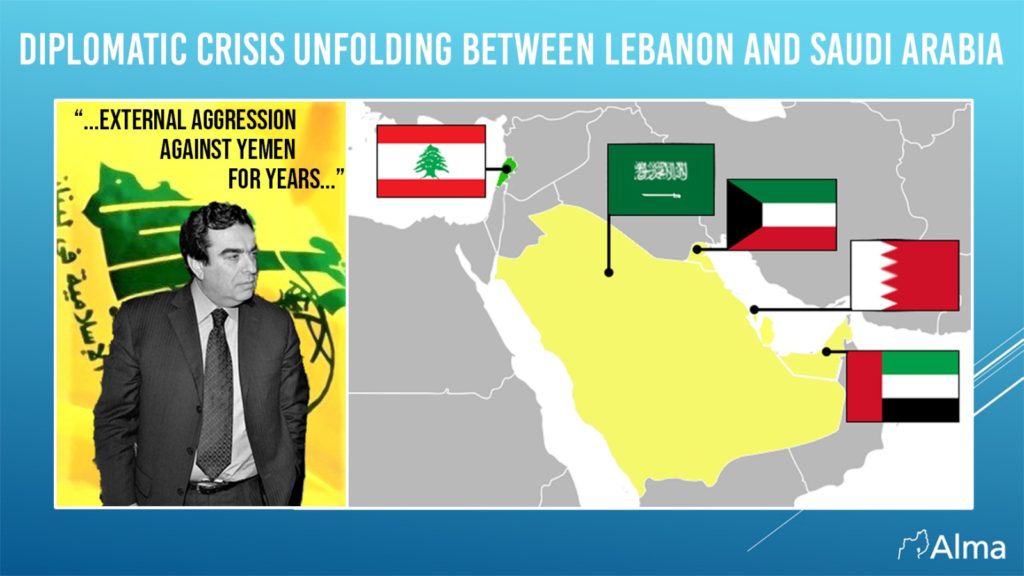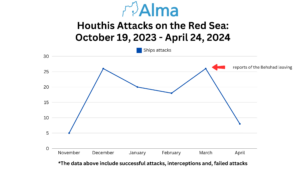A few days ago, Lebanese Minister of Information George Kardahi defended in a press interview about the Houthis in Yemen and referred to Saudi Arabia’s activities against them as “external aggression”. Kardahi is a Maronite Christian, a member of Suleiman Farangia’s “Almerda” current from the “March 8” political camp, a political camp to which Hezbollah also belongs.
Kardahi’s harsh statement against Saudi Arabia has caused a political and economic crisis between Saudi Arabia and Lebanon. In response to the Minister’s statement, Saudi Arabia expelled the Lebanese ambassador to Saudi Arabia and halted trade between the two countries. It is possible that Saudi Arabia also blocked the money transfer services from Saudi Arabia to Lebanon. Saudi Arabia was joined by Bahrain, Kuwait, and the United Arab Emirates, who also expelled Lebanese ambassadors from their territory, returned their ambassadors to Lebanon for “consultations” and called on their citizens to leave Lebanon immediately.
The economic implication of the trading halt has the potential for an annual loss of Lebanese exports totaling $750 million. And the inability of Lebanese workers in the Gulf (Saudi Arabia alone has about 400,000 Lebanese citizens) to transfer billions of dollars from their salaries to the faltering Lebanese economy, which (to say the least) needs it like breathable air.
The political and economic crisis has, of course, created a political crisis in Lebanon. Should Minister Kardahi resign or not? As of this writing, Hezbollah is backing the Minister and has even issued an ultimatum: If Kardahi is fired, then Hezbollah Ministers and Amal movement Ministers will also resign, and the government will stop functioning. According to other reports, other ministers are threatening to resign themselves if Kardahi does not resign…
Kardahi, for his part, has stated that he does not intend to resign and that this is a matter of national honor…
Did it all happen because of a Lebanese government minister’s unfortunate statement, or is it a more significant move? What does the severance of relations mean for the future of Lebanon?
What has happened between Lebanon, Saudi Arabia, and the Gulf states is an expression of the international system dilemma concerning Lebanon and the policy that must be pursued towards it. This calls into question whether Lebanon’s fate is doomed and whether Lebanon is in complete control of Iran’s hands through proxy Hezbollah? Or maybe Lebanon has more hope? And if so, what can be done? As a consequence of the policies of the Lebanese government, of which Hezbollah is a member, should the West sever relations with Lebanon or should it continue to assist Lebanon and the Lebanese army in order to preserve levers of influence?
The severance of relations between Lebanon and Saudi Arabia and the Gulf states will push Lebanon more firmly into Iran’s arms. In his next speech, Nasrallah can be imagined declaring that Saudi Arabia and the Gulf states will not succeed in breaking Lebanon and the Lebanese people. Nasrallah will argue that if Saudi Arabia stops Lebanese exports to the Gulf, Iran is ready to buy the goods immediately. This doesn’t include Nasrallah’s alternatives to appeal to China and Russia is…
On the other hand, we estimate that the decision of Saudi Arabia (followed by the Gulf states) was made even earlier. It is not just a matter of respect or spot insult. Saudi Arabia is simply tired of Lebanon’s conduct, or rather tired of the takeover trend of Hezbollah’s interest and narrative (as an Iranian proxy) over Lebanon.
A few years ago, the Saudis tried to produce a change in Lebanon. They brought the Prime Minister at the time, Hariri, to Riyadh and forced him to resign. This is out of a desire to detach him from his internal agreements with Hezbollah. The Saudi move failed, and under French pressure, Hariri was returned to Lebanon. Iranian involvement in Lebanon has only intensified since then. The Saudis are looking at the northern part of the Middle East with open eyes and see how part after part of Iraq, Syria, and Lebanon are falling into the hands of the radical Shiite axis headed by Iran. In addition, the Houthis from Yemen bother to remind the Saudi’s almost daily through missiles, UAV’s and the like, that the southern coast of their shared peninsula is also controlled by the radical Shiite axis headed by Iran.
A complete Saudi withdrawal from Lebanon means admitting the sad reality that Lebanon has become a country controlled by Iran, and any alternative mechanism does not exist due to corruption. As of this writing, the Saudi move appears to reflect this approach.
On the other hand, the opposite direction is the European and American approach. Based on this approach, one still has to look for the way to the heart of Beirut. This approach is reflected in the Lebanese Chief of Staff’s visit to the United States and in the appointment of former Israeli Amos Hochstein to conduct maritime negotiations. The Americans hope that Hochstein will make the Lebanese agree to resolve the dispute over the maritime border between Israel and Lebanon when it is clear that Israel already has a willingness to compromise on this issue.
If the fate of Lebanon is determined to be an Iranian fate (through Hezbollah), the significance for Israel is strategic. This directly affects the national security of the State of Israel. In this respect, on the northern border of Israel is based an Iranian proxy who controls the State of Lebanon and wants the destruction of Israel. At the same time, it is clear that there are still many Lebanese (members of all denominations and religions) who are imprisoned within this reality and are not interested in it.







One Response